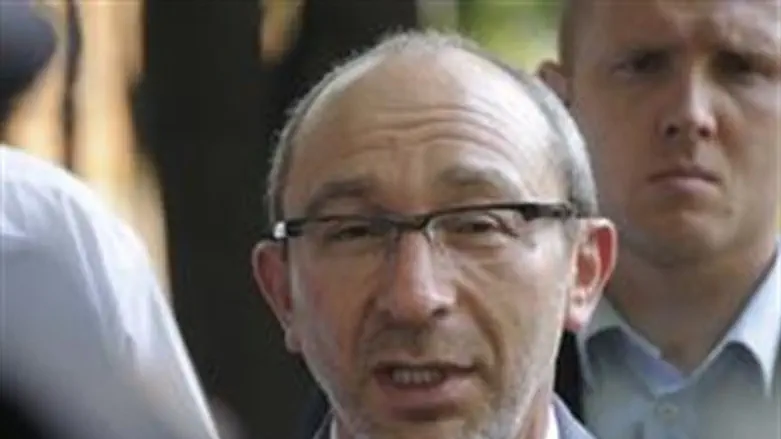
The mayor of the east Ukraine city of Kharkiv, who was wounded critically after being shot in the back by an unknown assailant, has been flown to Israel for treatment, local officials and the Israeli hospital treating him said Tuesday.
Yury Sydorenko, director of information at Kharkiv city council, said Israeli doctors decided after examining his wounds that mayor Gennady Kernes could be transported and he was flown out early Tuesday.
He is now being treated at Elisha, a private hospital in the northern coastal city of Haifa.
The hospital said the emergency surgery performed on him in Ukraine appeared to have worked.
"He was examined upon arrival, and the results show the operations were successful," medics said in a statement.
"He is under the supervision of the best doctors, and it seems he won't need further surgical intervention. The course of his treatment will be determined in a few days," the hospital added.
The shooting of Kernes in Ukraine's second-largest city was the latest violent incident in the east of the country where authorities have launched what they call an "anti-terrorism" operation against pro-Russian separatists who have seized a string of towns.
The European Union's foreign policy supremo Catherine Ashton condemned the shooting, saying she was "alarmed by the worsening security situation in eastern Ukraine".
Kernes appeared to have been targeted by a sniper although the circumstances and motivations behind his shooting remained unclear.
Locals officials say he was cycling but his entourage said he was jogging. The city council said he was "hit by a bullet in the back".
It was not clear whether the attack was directly related to the simmering tensions in eastern Ukraine.
The mayor is a colourful character, who has a criminal record for theft and fraud and is not known for tolerating dissent.
He is under investigation on accusations of kidnapping and torture but has clung onto his post in Kharkiv, an industrial hub of 1.4 million people not far from the border with Russia.
A one-time supporter of ousted pro-Russia president Viktor Yanukovych, Kernes was known for a particularly robust crackdown on the pro-Western demonstrations that shook Ukraine from November to February, banning any protests to "avoid the spread of infectious diseases".
Pro-Western activists were regularly assaulted. Some had their cars burnt while others were sprayed with a green liquid that is difficult to remove from the skin and impossible to remove from clothes.
He also encouraged the rise of the paramilitary group Oplot, whose leader Yevgeny Zhilin told AFP in an interview in February that pro-Western protesters should have their arms broken or eyes gouged out.
After Yanukovych was forced out in late February after months of pro-Western protests, Kernes briefly fled Kharkiv but then returned, moderating his opposition to the new authorities in Kiev and seeking to present himself in favour of a "united Ukraine."
The interior ministry in Kiev speculated that the attack was linked to separatists in the Donetsk region to "destabilize Kharkiv."
Political analyst Vladimir Fessenko said the shooting could be due to the fact Kernes had toned down his support for the Kremlin in recent weeks.
"This attack could be a signal to politicians and businessmen who are staying neutral in their region that they have to clearly choose sides," Fessenko said.
Kernes was "a strong and authoritarian leader. He pulled the strings and was a key element in the region's stability," added the analyst.
Arutz Sheva's Ian Gold reports from Kharkiv that Ukrainian authorities asked Israel to assist in treating Kernes. The authorities reportedly believe that Israeli doctors have more experience than Ukrainian ones in treating gunshot injuries of the type Kernes has suffered.
The fact that Kernes is Jewish may have factored into the decision as well.
The investigation into the attack indicates thus far that the mayor was shot by a “skilled” assassin who possessed an accurate weapon. An unexploded hand grenade was also found near the scene of the crime.
Kernes was injured in the lungs, stomach, liver and spine, and doctors are fighting for his life.
The rabbi of Kharkiv, Rabbi Moshe Moskowitz, told Arutz Sheva that the mayor is "a very dear Jew, with a warm and loving connection to the community, and we are shocked by the assassination.”
"We are praying for his health," he said, and urged those who wish to pray for him to mention "Moshe son of Hana.”